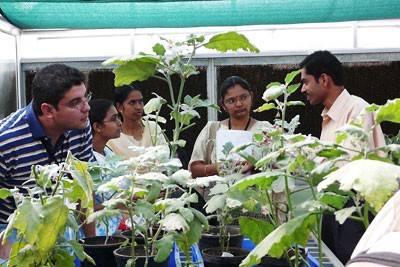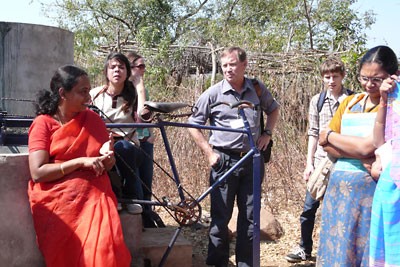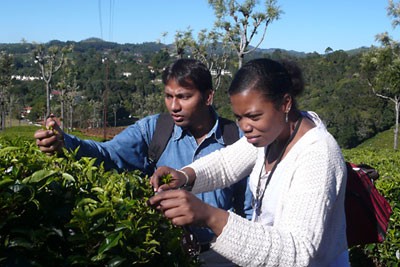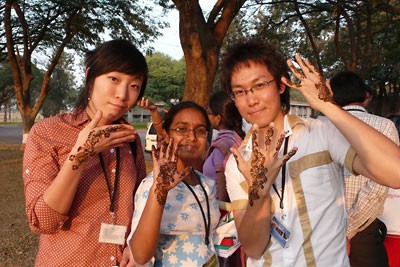Hands across Asia: Cornell students join Indian and Thai counterparts on international agriculture field trip
By Linda McCandless
HYDERABAD, India -- Some are learning about integrated pest management and marker-assisted plant breeding, others about goat and cattle herds. Yet others are learning the basics of growing sweet sorghum for biofuel, while others have plunged into microcredit, risk and self-help groups.
On New Year's Day, 29 Cornell students and eight faculty members left Ithaca for Hyderabad in central India as part of Cornell's International Agriculture in the Developing Nations II (IARD 602) class. There they met up with students from Indian universities. The three-week study tour then moved on to Bangkok, Thailand, and the country's northeastern region. The students will return home this weekend.
The course, led by Ronnie Coffman, director of International Programs in the College of Agriculture and Life Sciences, and plant breeder Kandukuri V. Raman, has been taking Cornell students on field study tours focused on agricultural development for the past 40 years. Over the years more than 1,000 students and 100 faculty and extension educators have participated in the course. This is the fifth year the class has gone to India but the first time it has visited Thailand.
In Hyderabad, the students settled into dormitory-style rooms at the International Crops Research Institute for Semi-Arid Tropics for five days. Then they traveled to Coimbatore, Chennai, Coonoor and Mumbai before leaving for Thailand.
"So far the most interesting thing is each other," wrote Marissa Fessenden '09, in the group's online blog at http://www.sathguru.com/intag602-08 on Jan. 3. "We are greeting again the Indian and Thai students we met in the fall, tuning our ears to sorting different accents and keeping our eyes open for (nearly) everything new."
A few of the students are undergraduates but most are graduate students. Says Coffman, an internationally recognized plant breeder and an alumnus of the class, "Wherever they come from and wherever they end up, we hear over and over again that this trip changes their world view forever."
Before the trip, the students chose one of four major interest areas. Each group -- agricultural systems, value addition and global marketing, animal health, and rural infrastructure and agricultural development -- has a different agenda and itinerary led by several faculty members with extensive experience in that area.
During the field trip, the students work together to develop group reports that build on lectures and readings from the class's fall semester. The U.S. students and the 55 Indian and Thai students, from eight universities, will present their collaborative projects in the spring semester.
The group shared the first morning's medical, historical, economic and cultural orientations, tea time, lunch and the afternoon's field tour of the crops research institute. Then, while the ag systems group was off hearing presentations about integrated pest management and marker-assisted plant breeding, the animal health group toured the International Livestock Research Institute and visited goat and cattle herds. The value addition and global marketing group went off to learn about growing sweet sorghum for biofuel and the local agribusiness incubator. The rural infrastructure and ag development group learned about microcredit, risk and self-help groups. They met up again for an evening of cultural activities that resulted in most of them having traditional Indian henna patterns painted on their arms and hands by local craftswomen. It was the beginning of the students' transformation.
This year, three field-trip alumni -- Coffman, professor of crop and soil sciences Peter Hobbs and extension educator Judson Reid -- are members of the faculty team. They are joined by Raman, professor of economic management Calum Turvey and professors from institutions in Thailand and India.
The participating universities in India include Tamil Nadu Agricultural University in Coimbatore, the University of Agricultural Sciences in Dharwad, Aharya N.G. Ranga Agricultural University in Hyderabad and G.B. Pant University for Agriculture and Technology in Pantnagar. In Thailand, they are Kasetsart University, Chiang Mai University, King Mongkut's Institute of Technology and Khon Kaen University.
This is the first in a series of articles by Linda McCandless, director of communications in the College of Agriculture and Life Sciences, who is accompanying the students and faculty on their Asian field trip.
Media Contact
Get Cornell news delivered right to your inbox.
Subscribe


